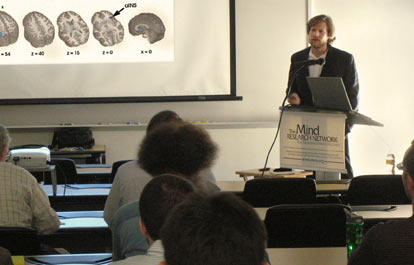

Scientific Lectures //
Transcranial Ultrasound Affects Mood in Healthy Volunteers – Implications for Neurotherapy
Joseph Sanguinetti, Ph.D.- Postdoctoral Fellow, University of Arizona
Presented: January 20, 2016
ABSTRACT: Noninvasive brain stimulation has the potential for improving mental health in humans. A novel method called transcranial ultrasound (TUS) can both excite and inhibit neural activity, and has many advantages over the established techniques. In this talk, I will describe results of three experiments that targeted the right frontal cortex in healthy human volunteers with TUS, and then will consider applications to improve mental health in patient populations. In experiments 1 and 2, a General Electric ultrasound device commonly used for medical imaging was used to target the right frontal cortex. Transcranial ultrasound improved self-reported mood for up to 30 minutes in two different groups of participants (placebo controlled in experiment 2). In experiment 3, a prototype ultrasound device developed for human brain stimulation was employed (Thync, LLC). Once again, right cortex stimulation improved subjective reports of mood relative to placebo. Taken together, these experiments suggest that TUS can affect mental states and may be useful for improving mental health. I will outline future directions with Major Depressive Disorder and Alzheimer's Disease.Please feel free to circulate.
To view this presentation please click here.

